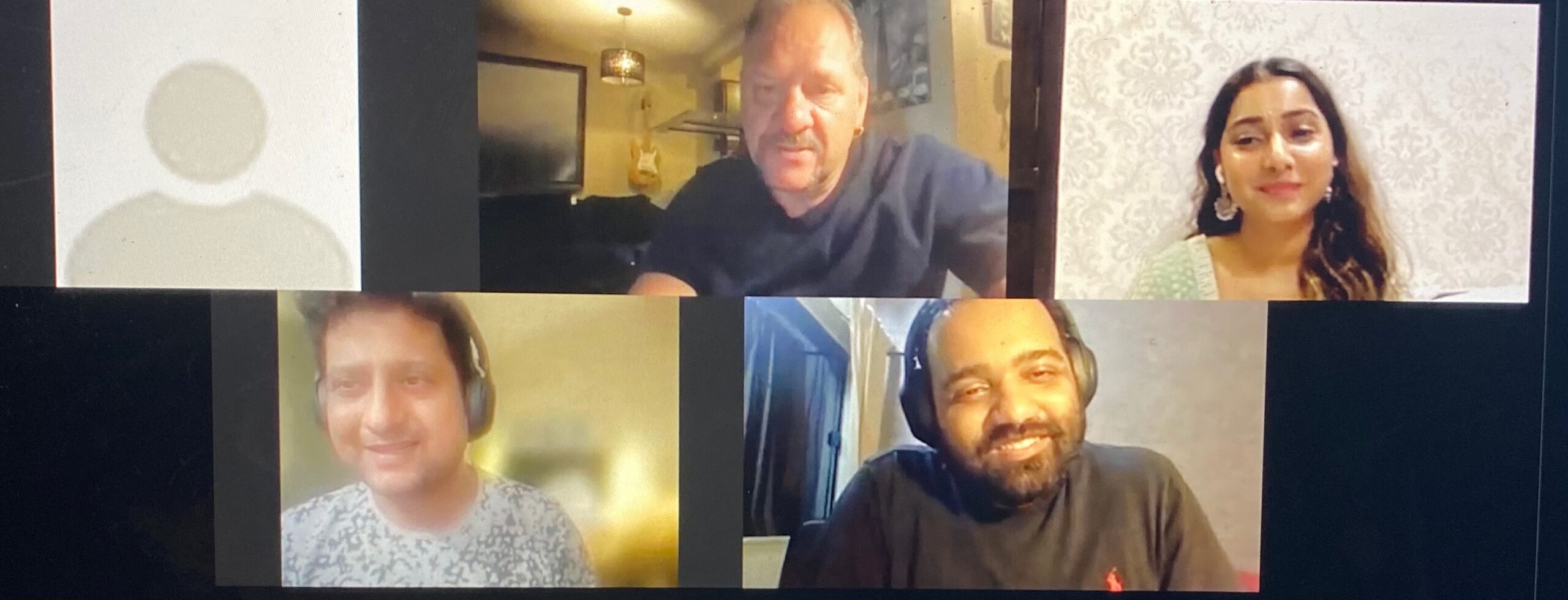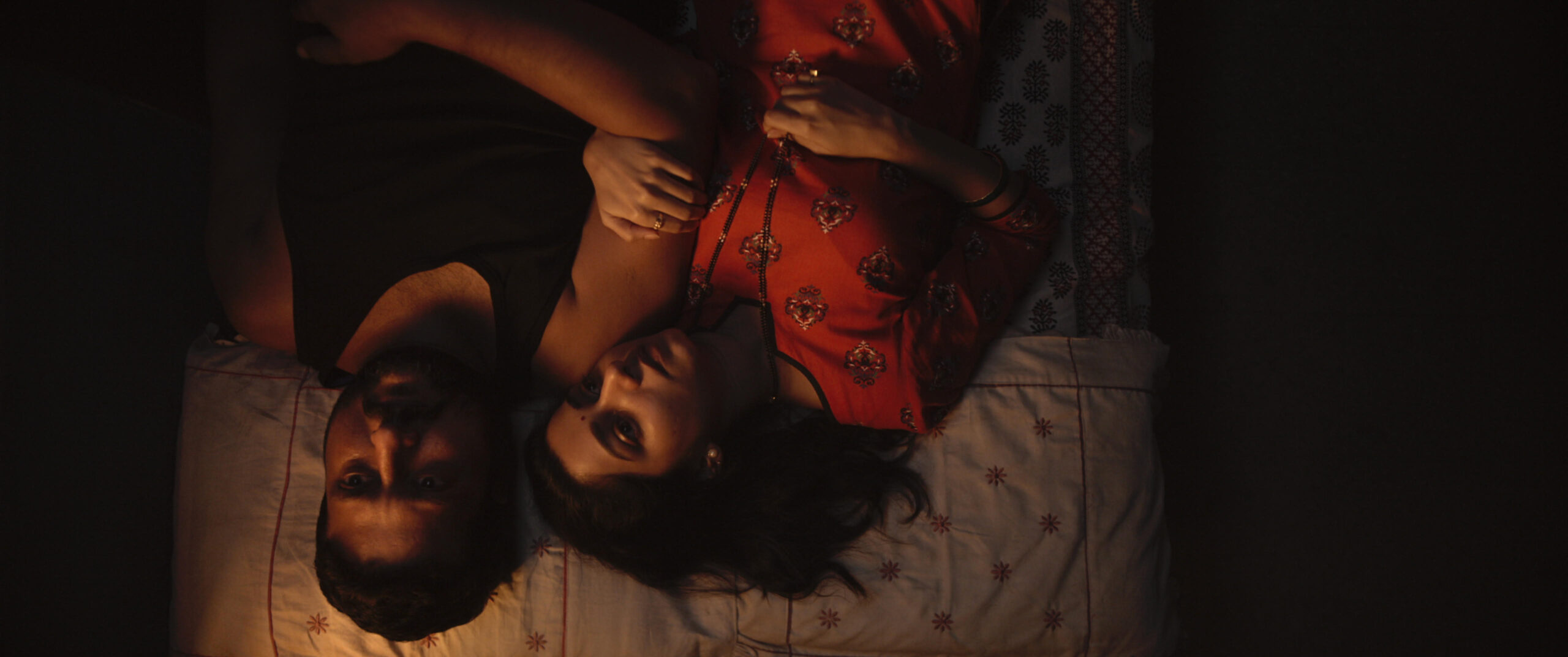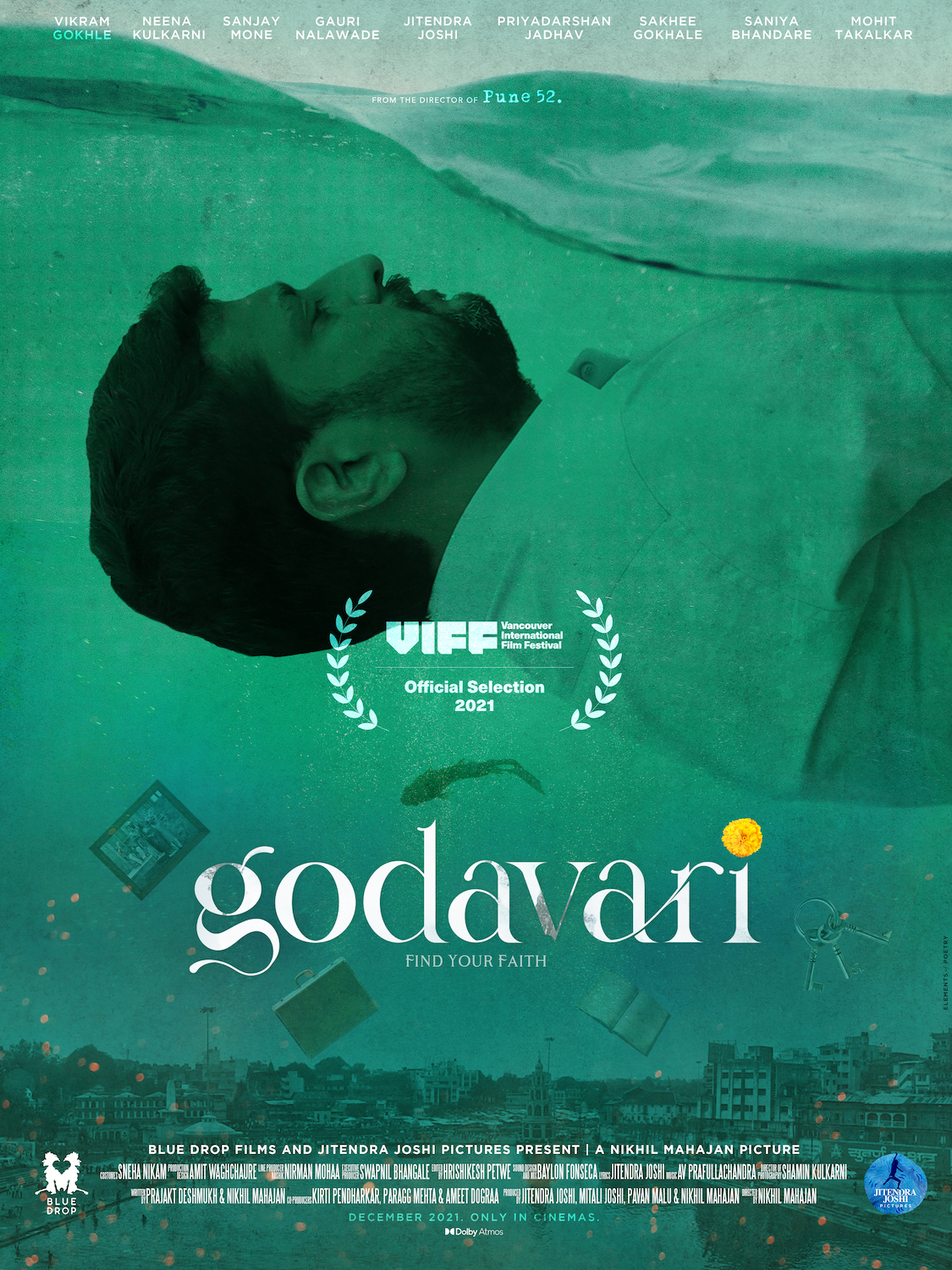Once you become an adult, you want to run and explore your newfound freedoms. That can mean – buying alcohol, moving into an apartment, starting a family, getting married, travelling the world and so on and so forth. Suddenly, you’re 50 and you don’t recognize your surroundings, your friends or who you’ve become. You were so busy celebrating your freedom that you’ve forgotten about your roots. The place that you fought so hard to separate yourself from, is suddenly – the only place you want to call home again. Before we run, we should walk, so we can truly appreciate what we are leaving behind and consider if it’s worth it.
The Vancouver International Film Festival Launches on Friday, October 1st and runs through October 11th, 2021. It’s a golden opportunity to see films from around the world that provide a window into traditions, culture, another life and another country. One amazing film arriving at the festival is Godavari. It was produced by Blue Drop Films and Jitendra Joshi Pictures and is written, directed and produced by Nikhil Mahajan, co-written by Prajakt Deshmukh. It’s produced by and starring Jitendra Joshi (Sacred Games, Ventilator, Cartel, Striker) and Gauri Nalawade (Adham, Kanha, Friends) The film was produced by Pavan Malu, Mitali Joshi, executive produced by Swapnil Bhangale and Shamin Kulkarni was the director of photography.
Godavari centres on Nishikant, a man who walks through the town of Nashik, collecting rent for his family of landowners. Each repetition of the cycle only intensifies his bitterness and anger towards his tenants, his family and the river that runs through the centre of Nashik – the Godavari. Just as his anger threatens to boil over, his family is confronted with a series of tragedies and revelations that shift their lives and their world into clearer focus. What ensues is a film teeming with an energy of reinvigoration, given wings by its ensemble of complex characters and unforgettable leading performance by Jitendra Joshi as Nishikant and Gauri Nalawade as his wife, Gautam.
Godavari isn’t only an intimate drama, it’s a cleansing experience, one steeped in the wisdom of tradition, compassion, and acceptance. Filmed in India in the Marathi language, Godavari stars a who’s who of Indian talent. Godavari marks a new beginning for Mumbai-based filmmaker Nikhil Mahajan, best known for directing the neo-noir Pune 52, vigilante action film Baji and the Netflix Original zombie horror series Betaal by Blumhouse. With Godavari, Mahajan shifts gears seamlessly into a dramatic space after a 6 – year hiatus from filmmaking. It marks a decided metamorphosis of directorial style and vision and is his most personal film to date.
Godavari will screen virtually throughout the festival’s run and in-person on October 4th and 10th as a part of the Contemporary World Cinema lineup.
I was quite excited and felt extremely privileged and honoured to speak with writer/director Nikhil Mahajan, lead actor Jitendra Joshi and supporting actor Gauri Nalawade on Zoom. Roll the tape!

HNMAG “Jitendra, amazing performance – you look much thinner than your character in the film.”
JITENDRA “My director Nikhil wanted me to be in that kind of shape because my character Nishikant is going through trauma and suffering. He’s not taking care of himself – neither his body, soul or mind. Nikhil wanted that to reflect in my character’s body, through putting on weight, which is why I did it.”
HNMAG “This is quite an emotional film. Would you consider this a redemption story, Nikhil?”
NIKHIL “This film is about redemption, life, death and all the emotions we go through in a lifetime. It’s also about retribution – knowing where your roots are and where you’re from. It’s about the human condition and the transformation of middle -class status to reflect and embrace modern western values, while struggling to hang onto our own traditions. The film is a snapshot of the life of an ordinary middle-class family in India, which is on the cusp of an existential crisis of sorts. I like to think of it as a story about the human condition in a broader sense.”
HNMAG “Gauri, you had an amazing role in this film, can you tell me more about your character, Gautam?”
GAURI “Our director, Nikhil was very helpful in getting me into my character, Gautam – as well as the tone of the character. Gautam’s life is quite different from my own life. The location also helped me because I had never been to Nashik. I had never had the opportunity to explore the area, and once I stepped foot inside the home where we shot the film – I was able to feel my character come to life internally and I didn’t have to method act too much. Although it was still an ongoing process, Nikhil would work with us in each scene. He was very meticulous about my volume because the scenes were very heavy at times. I tend to be over emotional, but he was able to control it and compose it into Gautam’s character. It’s to his credit as a great director.”
HNMAG “Can you explain the importance of the Godavari River and Nashik?”
NIKHIL “The majority of the Hindu culture will travel to Nashik to perform their last rights. It’s a place of tremendous religious importance. It was very interesting for us to be able to tell the story of this man’s spiritual transformation with the backdrop of a river that is literally the centerpiece of what Hinduism means. We never set out to make a religious film about Hinduism, it was about this man’s spiritual journey. It was interesting for us to place it amongst the madness that happens there.”
HNMAG “There is a scene, where you have to cry on camera. Is it difficult to cry with everyone watching?”
GAURI “You see… I am a cry baby (laughing), so it wasn’t too difficult but Nikhil was very good at communicating to me, not to cry when I find out about the brain cancer, but in my next dramatic scene, I had to come out and burst into tears, so he came to me to tell me I could cry. I had been thinking about the scene and what she must be going through, the agony and the pain all culminating together into that one big dramatic scene – so it wasn’t difficult to let it out, but there was the risk of overdoing it. There is a tremendous amount of emotion when dealing with loss but Nikhil was very good at cutting the shot abruptly, while I was crying at my heaviest. He was very precise with his shots and that credit goes to him.”
HNMAG “This film had a slow flow to it. Was that flow inspired by other directors that you admire or look up to?”
NIKHIL “For the flow of the film, it wasn’t inspired by any filmmaker. If you’ve ever sat by a river bank to watch the water flow, that is the same experience I was trying to recreate in the film. It’s not slow and it’s not fast, but you’re with it. If you felt that, then I feel that we succeeded in achieving that.”
HNMAG “Now Jitendra, you spend a lot of time in the water. Are you a good swimmer?”
JITENDRA “I’m not that good of a swimmer but I can swim in the banks of the Godavari. This river is 910 miles long but I’m much better in swimming pools (laughing).”
HNMAG “In the film, you’re only in the river for a couple of minutes but in reality, it was probably all day?”
JITENDRA “Not all day – let me surprise you by saying, we shot this film in 16 days. All that credit goes to Nikhil, our technical team and the people that supported us. The actors were ready and everyone was excited to shoot it. It was a bit challenging to shoot, because we shot it in Nov. Those shots in the water were at night, so it was pretty cold. That night, my brother Nikhil came to me before the shot to tell me that I’d be going into the river. He said I would be there for some time and he’d tell me when to come up. I said, ‘what are you talking about?’ He told me that he designed it like that. When we were there, he told me to jump in and perform. We have a saying – no man ever steps in the same river twice. It won’t be the same river and it won’t be the same man. I was not the same man that hated the river. As he begins to realize the importance of his being, his soul, his family, his people, his city… and his river, he approaches it for the first time, without ever being in it. When I finally stepped into it, in my mind – I was stepping in for the first time. That made me shiver more than the cold weather. As an actor and technician, you have to perform and Nikhil is a man of few words. However, those words are very effective if you’re listening and learning the character, going into the character. Because he is such a good friend of mine, I know what he wants from the character and what he expects from me. In this particular film, he would only say one thing to me, or as little as 1 word. That really changed me and my perception of how I was looking at the character.”
Jitendra continued to share with us the very special significance of the river. It was a personal story that went as far back as his early childhood. He told us that the first river he had ever gone into was the Godavari. He did it with his grandmother, who is unfortunately no longer with him. Astonishingly enough, it was at the same location, in Nashik. He said he used to imagine that same little boy that went into the river Godavari.

HNMAG “Nikhil, in the film, there are some beautiful ‘over the water’ shots. How did you accomplish those shots?”
NIKHIL “There are no drones in the shot. We didn’t have a lot of money to make the film, so we had to be creative. I’ve generally been very fortunate/lucky with financing in the past, but we had some unforeseen constraints on this film. All of the shots were done on a Jimmy Jib, including all of the shots done along the water. I give all the credit to my DOP (Sharmin Kulkarni) and if I’m a man of few words, I’m not sure what to call him… because he doesn’t talk at all. It’s his first feature film, it’s the editors first, but there’s a lot of exceptional talent that is very ambitious to break into the scene, which certainly helped.”
HNMAG “Now Gauri, from what I understand, marriage is very sacred in Hinduism. Is it difficult to play the role of a wife, if you’re married in India?”
GAURI “I feel that it is the easiest thing, if you know how to love somebody. I can’t speak for all of India or the world, but some men are so good at loving – so for me, it was not at all difficult. As a human being and as the character, she accepts him for who he is. As Gautam, I have immense respect and love for Jitendra, and I’ve seen his work – it was very easy. Whenever I would be around him, whenever I would look into his eyes, I would find comfort. The security he gave me as an artist and human being, knowing that he had so many hats to wear… such as actor/producer/his first film. Having gone through so much and being so kind, I was so comfortable around him and it made it very easy to get into character and do my job. In answer to your question, it was very easy to love him, to accept him for who he is and to help take care of him. It was pretty easy for me.”
HNMAG “Now Jitendra, as a producer – how did you come across this story?”
JITENDRA “It was the same night that my dear friend Nishikant Kamat had passed away. I had been talking to Nikhil about doing something in his memory and he had said ‘lets make a film!’ It was the best way to celebrate his life/his memory. The next day, Nikhil had pitched me a story about a man that is distant, a rascal and is deemed to die soon. How would that affect his environment and the people around him? That was Nikhil’s first impression on the story idea and he started working on it. On the 23rd we both went to Nashik and began roaming locations with another one of the co-writers, Prajakt Deshmukh. On the 21st I wrote a song and on the 24th, our music director incorporated it to create a beautiful tune that was used in the film. It energized the 3 of us and for the next 3 days, we locked ourselves into a suite, carving out the storyline. I wasn’t as involved as Nikhil or Prajakt but I was still instrumental/the catalyst for moving the story forward. After those 3 days, we had found the body but we were still searching for the soul. I was familiar with Nikhil’s process and I knew the kind of genius and talent he is, so I told them to write the script. Approx. 20 days later, they came up with 4-5 drafts of the script. I was simultaneously writing songs for the film that turned out very well. That was in the months of August, Sept, Oct. and we shot in November. We moved very fast on the film, thanks to the conviction of Nikhil Mahajan. This film was like raising a child.”
HNMAG “Was it difficult to obtain permits to film in Nashik?”
NIKHIL “It was very difficult, more so because of the pandemic situation. We shot it after the first lockdown was lifted. The government wasn’t too encouraging about filming in a densely populated area during a pandemic but we followed pandemic protocol and were extremely careful about keeping a small bubble. We informed them of our intentions of staying on location, filming on location, so we were well organized and cleared before we went there to film. We actually took extra precautions because we had 3 seniors in our cast that were 70 plus. We were very concerned about their health and safety while they took part in the filming, taking extra precautions to ensure that everyone felt protected and safe.”
HNMAG “At the end of the film, there is a dedication to someone that has passed away. Was that an actor in the film?”
NIKHIL “It wasn’t actually an actor, it was a very well celebrated filmmaker from India, Nishikant Kamat that happens to be a dear friend of Jitendra’s, an inspiration to me in my early days of filmmaking and someone I really looked up to, in terms of filmmaking. We lost him on August 17th of last year. Jitendra and I were quite sad the night he passed and we had agreed that the only way to truly honour his memory, is if we made a film in his memory. It was just like divine coincidence that we had the confirmed release of the film on August 17th of this year, exactly one year after his passing. We could feel his presence throughout the making of this film… it was as if he was our guiding light. As filmmakers, we want to make films while we’re alive and I don’t think there can be a better afterlife/legacy than a film.”
This was an exceptional film with exceptional talent. A must see at the Vancouver International Film Festival.

